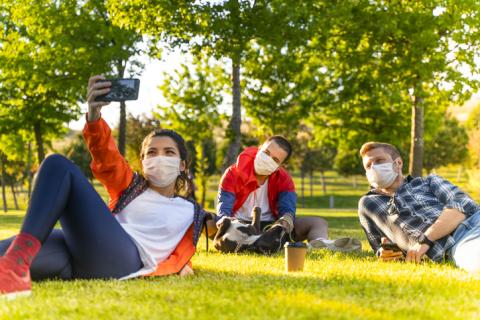Seniors Aren’t the Only Ones at Risk of Severe COVID-19 Illness
Younger folks were told to be cautious in order to protect vulnerable elders. But there’s more and more evidence that younger adults, too, can be at risk of a severe case—especially if they have certain common underlying health conditions.
On June 25, the Centers for Disease Control and Prevention (CDC) issued updated information on risk factors for severe COVID-19 illness. As medical researchers have gained greater understanding of how the virus spreads and affects people, it has become apparent that the situation was more complicated than previously thought.
For one thing, not all older adults are at the same risk. “As you get older, your risk for severe illness from COVID-19 increases,” says the CDC. “For example, people in their 50s are at higher risk for severe illness than people in their 40s. Similarly, people in their 60s or 70s are, in general, at higher risk for severe illness than people in their 50s. The greatest risk for severe illness from COVID-19 is among those aged 85 or older.”
The CDC also now says that younger people with certain health conditions are also at higher risk. There is strong evidence that these conditions raise the risk:
- Obesity (BMI of 30 or higher)
- Chronic kidney disease
- Type 2 diabetes
- Serious heart disease, such as heart failure or coronary artery disease
- Chronic obstructive pulmonary disease (COPD)
- Immuno-suppressing conditions
- History of organ transplant
- Sickle cell disease
Obesity is the top risk factor, second only to age.
Research on COVID-19 is still underway, so it’s too soon to have a fully accurate picture, but the CDC cites evidence that other health conditions, too, could also raise the risk. These include asthma, cystic fibrosis, hypertension, dementia, liver disease and type 1 diabetes. Pregnancy may also be a risk factor.
The CDC says, “The more underlying medical conditions someone has, the greater their risk is for severe illness from COVID-19.” Some experts have stated that having even one of the conditions above can raise a person’s risk to the same as someone decades older. And don’t forget—sometimes in serious cases, the patient has no known risk factors.
The CDC says the best way to protect against COVID-19 is to:
- Limit interactions with other people as much as possible.
- Wash your hands often or use a hand sanitizer that contains at least 60% alcohol.
- Avoid touching your eyes, nose or mouth with unwashed hands.
- Avoid contact with people who are ill.
- Stay six feet away from others outside of the home.
- Cover your mouth and nose with a cloth face cover when around others.
- Stay away from others who are not wearing a face covering.
- Clean and disinfect frequently touched surfaces daily.
- Be alert for symptoms (fever, shortness of breath, cough; find a full list of symptoms here).
If you have one of the health conditions listed in this article, it’s important to follow your doctor’s orders about your health care, medications, and a healthy lifestyle. Many lifestyle changes can improve your condition and lower your risk.
